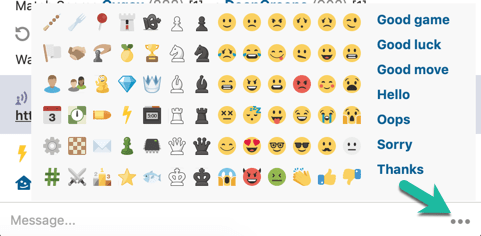
How To Be a Good Sport in Online Chess
Every day, thousands of chess lovers from all over the world use Chess.com to connect - playing, learning and sharing our favourite game. The chessboard has incredible power to erase differences of language, culture, and age; that's a huge part of what makes the game so great. On the other hand, chess has produced some legendary examples of poor sportsmanship. The great Aron Nimzowitsch himself is said to have jumped up near the end of an unfortunate (for him) game in 1925, only to shout "Why must I lose to this idiot?!" ... Sheesh!
As wonderful as online chess can be, the anonymity of the Internet and maybe even the nature of the game do create scope for poor behavior. Some people come to the site with mischief as their goal, but that's not the only problem. Newcomers, for instance, may genuinely be unaware the "etiquette" of starting and ending chess games online and so on.
So let's define what good sportsmanship looks like at Chess.com, and then talk about what to do if unfortunate things happen - including what we do in Live Chess to discourage poor sports.
- Starting Games
- Finishing Games
- Automatic Player Restriction (Live Chess)
- Game Chat
- Fair Play and Cheating
Starting Games
A good thing to keep in mind in Live Chess is that, whenever someone chooses to abort a game (either manually or by waiting without making a first move until the server does it), they waste not only the time spent creating and waiting on their own seek, but their "rejected" opponent's time as well. It's irritating to seek a game, get one, and then have it vanish, forcing you to start over. A few sporting suggestions...
PLEASE DO...
✔︎ Configure your open challenges to improve your chances of getting the match you want. You can set a rating range for your opponent - and if you don't mind playing Unrated games, you can even choose what color you want to play.
✔︎ Choose appropriate time controls given the time you have available to play. Might be interrupted any second?... Have you tried Puzzle Rush?
✔︎ Abort games in case of life's unexpected interruptions. We get it - that's why the option is there!
PLEASE DON'T...
❌Abort games because you wanted to play the other color. Again, in unrated games, you may choose your color, presumably for training purposes. For rated play, the server's pairing logic tries to equalize each player's exposure to both colors.
❌Abort games because you don't like your opponent's rating, or their first move, or the cat photo they use for their profile pic. Again, you can configure your seek for a particular rating range. But most people just let the server find the best match it can without making them wait too long. Chess encourages (and rewards) flexibility.
❌Abort games because your opponent takes too long to move. This is a tricky one. If they really take too long to move, then the server will end the game as though they aborted. So... why not save a few seconds and do it yourself? Because the server tracks the number of times a given member aborts games, and restrictions may result from aborting too frequently. (See below.) If it looks like your opponent is going to time-out/auto-abort the game, you should let them.
☝️Read More: Timing Rules in Live Chess
Finishing Games
"The only way to prove you're a good sport is to lose." ~ Ernie Banks
Losing a chess game can be a frustrating experience (remember Nimzowitsch's outburst..), but the good news is that it doesn't have to take a long time. If your position on the board is hopeless, and you have no hope of swindling your opponent on the clock, then it might be a good time shake hands and move on. GG!
PLEASE DO...
✔︎ Finish every game you begin. Resignation is a most excellent and classy way to lose a chess game. Plus now you're just one click away from your next game - or analyzing that last one to see where it went wrong.
PLEASE DON'T...
❌"Resign" by closing your browser, shutting your laptop, or otherwise just "walking away." This requires your opponent to wait out some or all of your remaining clock time to get the result they earned. Please don't do this. If you have given up, your opponent reasonably expects you to resign without delay.
Automatic Player Restriction
Being a good sport is its own reward. In Live Chess, this is a design principle as well as a general value, because not only do good sports naturally avoid the restrictions that come from poor sportsmanship; they also tend to avoid poor sports themselves, during player pairing.
Every player in Live Chess has a kind of "sportsmanship score" on the server - and this score is negatively affected by things like aborting games, disconnecting, or making opponents wait for nothing at the end of a game. It is positively affected by games played where none of those things happen. If a player's score gets too low, their experience in Live Chess could be affected in three main respects:
1. They lose the ability to abort. Quite simply, aborting (even by delaying at the beginning) becomes impossible; the player resigns instead, with impact to their rating.
2. They get matched in a separate, "Poor Sport" pairing pool. The point of this is to protect players who don't habitually abort, disconnect, or delay, from those who (currently) do. You do not want to be in this pool. For one thing, it's where all the people with sportsmanship issues are... For another, it is a much smaller group, so it can take a loooooong time to get matched.
3. They lose the ability to compete in Tournaments. Poor sportsmanship is even more disruptive in Arenas and Swiss events.
Think you're in the Poor Sport Pool already? Just check the tips above, and play some good-sport games. (Games with your Friends count too.) Once your score returns to a more normal value, all three restrictions are lifted (also automatically).
Game Chat
Unfortunately, the other main outlet for poor sportsmanship in online play is much more personal: the game's Chat. Here, angry players occasionally lash out in frustration. The worst cases try to intimidate through threats of violence and hateful speech. This is something you might encounter rarely, if ever, but sadly, it happens. Tips? Sure!...
PLEASE DO...
✔︎ Be kind to your opponents! Sorry, Bobby. The essence of sportsmanship is being a tough player on the board and good-natured and friendly in the chat
✔︎ Visit your Live Chess settings and confirm your Game Chat availability is set as you desire. Chatting is not a requirement!
✔︎ Take advantage of Quick Chat! It's safe. It's even auto-translated! It might be all the Chat you want for most games!

...Disable Game Chat at the first sign of trouble! Seriously...

...Up- or down-vote your opponent's sportsmanship after each Live game.

If your opponent was a good sport, you can simply click the thumbs-up and that's that!
On the other hand, if the experience was bad, either because of things said in Chat or the behaviors described above, you can hit the thumbs-down, which has two effects: First, it lets us know there's an issue; second, it will immediately allow you to Block and/or more formally Report the member. (Blocking a member ensures that you won't be matched with them again in open pairing, and they can no longer communicate with you.)

These reports are reviewed daily by a dedicated team whose job it is to keep the site a fun and safe place to enjoy chess.
Fair Play and Cheating
Cheating in online chess is a huge concern and something we take very seriously at Chess.com. We combat it with technology and a crack team of anti-cheating specialists. We close accounts for cheating constantly, and we even refund rating points if we think honest members have been affected by a member whose account we have closed for cheating.
And the good news? The vast majority of members are honest players who just want to have fun and enjoy chess.
PLEASE DO...
✔︎ Know the Rules! For instance, Daily Chess allows you to use Explorer throughout the opening, but in Live Chess, such resources are NOT permitted. Getting advice (from humans or software) is always against the rules. So is using multiple accounts to manipulate an account's chess rating, or artificially lowering one's rating to enter and win a tournament ("sandbagging").
☝️Read More: Chess.com Fair Play Policy
✔︎ Report players if you suspect they are cheating. We'll check! And thank you - that really helps!
PLEASE DON'T...
❌Break the rules. C'mon, you knew we were going to say that. ![]() Account suspension or closure is no fun anyway.
Account suspension or closure is no fun anyway. ![]()
❌Accuse your opponent of cheating, either in Chat or publicly. No good will come of that - in fact, you will likely end up being reported for harassment. Report them instead.
❌Worry about cheaters. It's just not worth it. Again, most players are honest - and if you're not at least an expert level player, you're exposure to cheating is likely to be even less. In short, we are confident that your exposure to cheaters on Chess.com will be very far from the norm.
Well, that's it! Thanks for joining us on this exploration of online chess sportsmanship. Thanks even more for the patience, respect, and basic consideration you show every day to your opponents and fellow chess lovers here on Chess.com. That's just the best.






